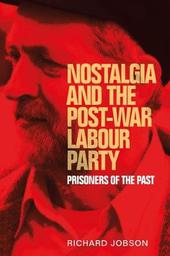
|
Nostalgia and the Post-War Labour Party: Prisoners of the Past
Paperback / softback
Main Details
| Title |
Nostalgia and the Post-War Labour Party: Prisoners of the Past
|
| Authors and Contributors |
By (author) Richard Jobson
|
| Series | Manchester University Press |
|---|
| Physical Properties |
| Format:Paperback / softback | | Pages:232 | | Dimensions(mm): Height 234,Width 156 |
|
| Category/Genre | British and Irish History |
|---|
| ISBN/Barcode |
9781526113313
|
| Classifications | Dewey:324.2410709045 |
|---|
| Audience | | Tertiary Education (US: College) | | Professional & Vocational | | General | |
|---|
|
Publishing Details |
| Publisher |
Manchester University Press
|
| Imprint |
Manchester University Press
|
| Publication Date |
14 September 2021 |
| Publication Country |
United Kingdom
|
Description
This book examines the impact that nostalgia has had on the Labour Party's political development since 1951. It argues that nostalgia has defined Labour's identity and determined the party's trajectory. Nostalgia has hindered policy discussion, determined the form and parameters of party modernisation, shaped internal conflict and cohesion and made it difficult for the party to adjust to socioeconomic changes. It has frequently left the party out of touch with the modern world. In this way, this study offers an assessment of Labour's failures to adapt to the changing nature of post-war Britain and will be of interest to both students and academics and to those with a more general interest in Labour's history and politics.
Author Biography
Richard Jobson is a Lecturer in Twentieth-Century British History at the University of Exeter -- .
Reviews'The struggle to try and get the Labour Party "face the future", as our 1945 manifesto was titled, has - irony of ironies - its own rich history. Richard Jobson's fascinating study, Nostalgia and the post-war Labour Party, documents this thoroughly.' Bridget Phillipson MP, New Statesman 'A serious contribution to the understanding of struggles within the Labour Party [which] raises significant questions about how parties engage with their own past to their advantage and disadvantage and how the past informs and sometimes perhaps restricts current politics. Most importantly, it shows that nostalgia is not simply an issue for the right, for Brexit and Trump voters, but is a charge that the left too has to deal with.' Tobias Becker, History Workshop Journal -- .
|